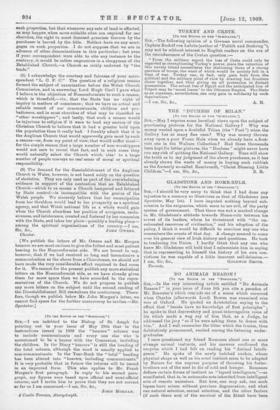WELSH DISESTABLISHMENT.
[TO TUE EDITOR Or TUB " SPECTATOR."1 should like to offer a few observations on the letters on the above subject which appeared in your issue of the 22nd ult.
(1) Your correspondent Mr. John Morgan has arrived at the figures which he represents to be those of the Welsh Calvinistic Methodists in Wales and Monmouth by deducting from the total number of their communicants those in the churches, among others, of the Lancashire, &c., Presbytery; but some twenty-three churches of that Presbytery are in Wales, and therefore his result is not correct. But he has fallen into a still greater error by adding the communicants to the "hearers," whereas the latter include the former, as pointed out in your last issue.
(2) The letter of your correspondent Mr. Hickey was probably written before the appearance of the Bishop of St. A.saph's letter in your issue of the 15th ult., in which he admits that the statistics of the various religious denomina- tions were submitted in good faith, and that he doubted "the fairness and the wisdom of trying to discredit them." It is true that his Lordship reserves to himself the right "to criticise their comparative value and significance," which right will, no doubt, be also exercised by Nonconformists in their examination of the statistics of the Anglican Church when they appear in detail in the Commission's Report.
(3) With regard to the question of endowments, referred to by two of your correspondents, the purpose of my previous letter was to correct what purported to be a statement of fact. Welsh Nonconformists are not opposed to endowments per se. The Calvinistic Methodists, for instance, have created endow- ments by means of voluntary contributions for the main- tenance of their Theological Colleges, and in part of their missionary societies, and also, to a limited extent, for the support of their ministers in sickness and old age. But I doubt whether any Nonconformist body would seek by means of endowments to relieve the sense of responsibility which now attaches to a Church for the support of its own ministry. On the general question of the disendowment of the Anglican Church in Wales, what is claimed by Nonconformists is that benefactions which were created at a time when no other religious body existed in Wales should not in equity be enjoyed exclusively by a Church that only claims about one. tenth of the population, a large percentage of whose com- municants is made up of English immigrants to Wales. The limitation of disendowment in the Government Bill to the benefactions created before the Act of Uniformity is, in our opinion, a very generous provision in the interest of the Anglican Church. (4) Your correspondent Mr. Douglas states that the endowments of Nonconformist bodies include, inter taia,, the possession of public-houses. I can speak definitely of the denomination to which I belong, not only that we have no
such properties, but that whenever any sale of land is effected, as may happen.when more suitable sites are required for our churches, the right to erect licensed .premisee thereon by the purchaser is barred by the title. Neither have we any mort- gages on such properties. I do not suppose that we are in advance of other denominations in this particular ; but even if your correspondent were able to cite any instance to the contrary, it would be rather ungracious in a clergyman of the Established Church,—a Church so richly endowed by "time trade."
(5) I acknowledge the courtesy and fairness of your corre- spondent "L. C. F. 0," The question of a religious census formed the subject of examination before the Welsh Church Commission, and in answering Lord Hugh Cecil I gave what I believe is the objection of Nonconformists to such a census, which is threefold,—viz., that the State has no right of inquiry in matters of conscience ; that we have an actual and reliable record of our communicants, children and pro- bationers, and in most churches of what may be classified as "other worshippers" ; and lastly, that such a census would be injurious to religion if it were to lead any section of the Christian Church to believe that it had a greater hold upoh the population than it really bad. I frankly admit that it is the Anglican Church that would apparently gain most by such a census—or, from my point of view, that would suffer most-1. for the simple reason that a large number of non-worshippers would not care to reveal that fact, and in such cases they would naturally select the Church which, alas! to a large number of people conveys no real sense of moral or spiritual responsibility.
(6) The demand for the disestablishment of the Anglican Church in Wales, however, is not based solely on the question of statistics. They are only used as part of the overwhelming evidence in support of the contention that an Established Church—which to us means a Church hampered and fettered by State control—is incompatible with the genius of the Welsh people. We sincerely believe that her emancipation from her thraldom would lead to her prosperity as a spiritual agency, and that Welsh national life as a whole would gain when the Church abandons her position of arrogance, exclu- siveness, and intolerance, created and fostered by her connexion with the State, and takes her place—possibly a leading place among the spiritual organisations of the country.—I am,
[We publish the letters of Mr. Owens and Mr, Morgan because we are most anxious to give the fullest and most patient hearing to the Nonconformist side. We are bound to say, however, that if we had received so long and inconclusive a communication as the above from a Churchman, we should not have made the very considerable effort required to find room for it. We cannot for the present publish any more statistical letters on the Nonconformist side, as we have already given them far more space than we have accorded to the repre- sentatives of the Church. We do not propose to publish any more letters on the subject until the second reading of the Diaestablishment Bill reawakens the controversy. There- fore, though we publish below Mr. John Morgan's letter, we cannot find space for the further controversy he invites.—En. Spectator.]











































 Previous page
Previous page